FRANCESCO: New documentary on Pope Francis, Discovery Channel
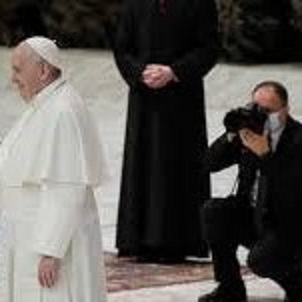
This is the fifth major feature film focusing on Pope Francis.
There was a 2015 Argentinian drama, Francisco, El Padre Jorge;
there was the 2015 Italian drama, Call Me Francis;
worldwide audiences watched The Two Popes, 2019, a fictionalised encounter between Francis, played Pryce and Benedict XVI, played by Anthony Hopkins.
In 2019 there was a documentary by celebrated German filmmaker, Wim Wenders, Pope Francis, a Man of his Word, with limited release (but, Googling the title and adding You Tube, several previews as well as some substantial clips can be found).
Now, Francesco has been acquired by the Discovery Channel, with limited screenings, but with rental or video on demand.
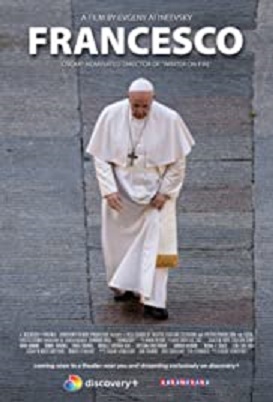
Review and comment
Francesco completed filming in April 2020, featuring the Pope and an assistant on the dais altar in an empty piazza in front of St Peters. But, at the end, there is enthusiastic footage from countries all over Europe and the United States, people in lockdown, but coming to their windows and doors, waving, shouting, applauding – images of hope (not yet fulfilled). This film is a lively and challenging overview of Pope Francis’ seven years as Pope, 2013-2020.
The director is Russian and has made a number of documentaries, focusing on the war in Syria, conflicts in Ukraine, as well as a documentary about divorce. In this film, as with Wim Wenders’ documentary, the words of the Pope are significant, from public addresses, to more personal encounters, to interview statements. But, these films are not simply “talking heads” documentaries. The director and his assistants have done extensive research all over the world, finding a powerful range of footage from Pope Francis visits to different countries, to meeting significant personalities, and striking and vivid footage to illustrate the particular crises around the world of his seven years’pontificate.
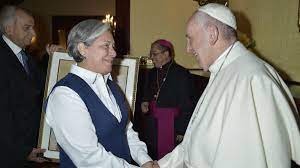
With the sister who works on the US Mexico border
Instead of providing some background to Francis, his Argentinian and Jesuit backgrounds, his work as Archbishop in Buenos Aires, two key issues are initially highlighted. The first is that of climate change, the Pope’s document, Laudato Si, his visit to the Philippines in the wake of the severe typhoons. The second issue is that of migrants throughout the world, his visit to the refugees on the island of Lampedusa, refugees from Africa, refugees from Syria and visuals of the desolation of ruined Aleppo…
With this social consciousness in mind, the film then goes to the portrait of Francis, a sketch of his life, photos of his family, the story of their migration from Fascist Italy, growing up in Argentina, his vocation, joining the Jesuits, his role as Jesuit provincial – and quite a section later taking up the issue of accusations of collaboration with the Generals during the Dirty War, vocal criticism, examination of the issues, some critics retracting, the Pope explaining a more silent approach to work behind the scenes, followed by two years seeming exile away from Buenos Aires. It seems this period gave him time to reflect, to mellow his stances, to be conscious of the poor, something he took to his ministry as Archbishop.
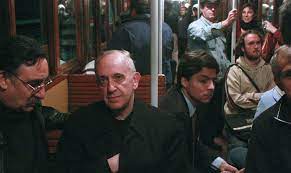
Cardinal on public transport
The film provides quite a number of clips of Cardinal Bergoglio and his work in Argentina, continually with the poor, taking public transport, but also his strong interfaith links.
There is quite a challenge as the film documents Francis’ visits to conflict centres around the world, to the Central African Republic, to the island of Lesbos to meet the refugees, to Myanmar where diplomacy required no mention of the Rohingya, to Bangladesh and meeting the refugees. He also goes to Mexico denouncing walls that separate instead of building bridges which reunite (and a glimpse of President Trump). There is also the sequence of his addressing the American Congress (with Joe Biden, then VP, sitting behind the Pope).
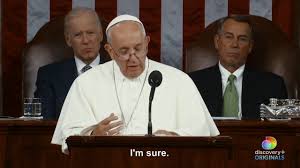
Vice President Biden listening
There is a very personalised sequence where the Pope has a Zoom conference with those working on the American-Mexican? border, especially his singling out unknown a nun, champion of the poor, and a close-up of his more affectionate language with her.
There are several other very personalised encounters, the three Muslim families that he brought back to Italy as an example of leaders welcoming refugees, his visit to them, their testimonies, the finding home and employment in Italy. Then there is the father who wrote a letter to Francis, giving it to him at an audience, explaining that he and his gay partner had three children, wanting the Pope’s assistance in their being accepted at the parish school.
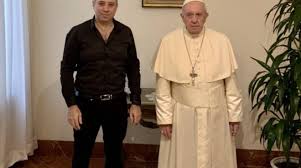
The Pope phoning the father, encouraging him, the film including a quotation of the Pope talking about recognition of gay men and women in society, of civil unions… The film does not quote, “who am I to judge?”, but includes this more ordinary episode.
The issue of women in the church is raised, a number of speakers, the Pope emphasising that women must have roles in the church – but, interestingly, for all the ceremonies, those assisting and servers are all male.
But, the treatment of sexual abuse by clergy is presented in a tantalising way, something like the old-fashion serials, the audience left with cliffhangers, wondering what and when the sequel will be. In fact, the subject does receive quite a lot of attention but in separate sections, increasing in dramatic tension, throughout the film. There is the sequence where the Pope seems to have lost his temper accusing critics of the Chilean Episcopacy of slander. Later, especially with interviews with Juan Carlos Cruz, the leader of the young men who accused the Chilean celebrity priest, Karadima, of years of abuse, presenting his case, being invited to the Vatican, wary that it was a PR exercise, meeting the Pope, hearing his apology, having a three hour conversation, present at a papal audience. Then there is the episode, surprising those in Chile, of summoning the Chilean bishops, firing a number of them, declarations about stricter investigations, the sending of official investigators to Chile, their 2,300 page report…
Juan Carlos Cruz is one of a significant number of authoritative talking heads throughout the film.
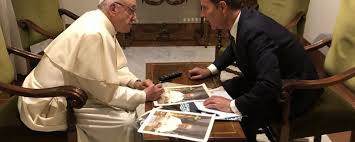
3 hour conversation with Juan Carlos Cruz
So, here is an opportunity, a two hour consideration of Pope Francis, growing awareness of all the world situations where he has intervened. But, there is a chance to see him at greater length in close-up, with people (as with his Jewish and Muslim long-time friends as well as leadership of churches and world religions), his body language, his unsteady walk, for instance, in Auschwitz, the close-ups when he is speaking officially, or in homily, or in personal encounters.
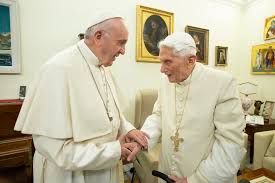
And showing the bond between Benedict and Francis
Not the last word. Not the last image. But an opportunity to make some kind of assessment, some kind of appreciation (and, one hopes, a good impression on those Catholics who have publicly expressed disagreement with or condemnation of, Francis) of an unanticipated Pope and seven years of unanticipated papal service.